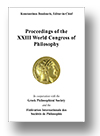|
1.
|
Proceedings of the XXIII World Congress of Philosophy:
Volume >
36
Hossein Dabbagh
Revival of “Rule-Utilitarianism” in Contemporary Islamic Philosophy:
An Examination of Post-Revolutionary Iran’s Muslim Intellectuals
abstract |
view |
rights & permissions
| cited by
This paper raises a moral issue for contemporary post-revolutionary Muslim intellectuals in Iran. According to traditional Islamic philosophers such as Al-Ghazali, ethics, following what Prophet Mohammed said, must transcend people form this mundane world. If this is so, ethics would need to teach people how to improve their virtues. Most of the contemporary Muslim intellectuals tried to pave the way for accomplishing this goal. After clarifying the reasons why new Muslim intellectuals have faith in virtue ethics, as the best possible moral normative theory, I claim that virtue ethics (and to some extent deontologism) fails to support some of our modern problems, such as human rights. Also, I argue that virtue ethics is not the best theory for ordinary average people who have a weak will. A preliminary conclusion of the paper will be that Utilitarianism, generally, and principle of utility, specifically, can do this job better. This has been overlooked by new Muslim intellectuals, according to my opinion. Yet, I suggest that among different versions of Utilitarianism, Rule-Utilitarianism is more suitable for this role.
|
|
|
2.
|
Proceedings of the XXIII World Congress of Philosophy:
Volume >
36
Mohammadreza Shahidipak
Averroes and his Commentary on Plato’s Socio-political Philosophy
abstract |
view |
rights & permissions
| cited by
Classical Greek socio-political philosophy belongs to Plato and Aristotle and is based on the paradigm of liberty of human wisdom in presenting values in order to manage his life. Averroes (1126 A-D) tried to interpret and support their philosophies against the theologian of Bagdad Ghazali, and this resulted in the development of a new global philosophy in Spain. In Averroes’ view, philosophy does not belong to Greece, and its universal truth cannot be limited to nation, time or place. Following this paradigm, he created some rationalistic trends, previously established by Averroes in Cordoba, Morocco, Cairo, Paris and London and destroyed the cultural unity of the Medieval world. Lulle and Aquinas, the Christian men, and Moses Maimon, the Jewish man, had written dissertations based on Averroes rationalism either in his favor or against him. This paper is an analysis of the socio-political philosophy of Averroes through the concepts of freedom, justice, ruler’s attributions and good life, and which, on their part, are based on a commentary of Plato’s Republic and Aristotelian views. The problem which is stressed out is whether Averroes has formulated an independent political philosophy, and whether he violated Plato’s views on ruler’s attributes. If the answer is a positive one, then we are facing a paradox of Averroes’ political philosophy.
|
|
|
4.
|
Proceedings of the XXIII World Congress of Philosophy:
Volume >
36
Yusef Waghid
The ‘Arab Spring’ and the Illusion of Educational Change:
Towards an Islamic Education for Cosmopolitanism
abstract |
view |
rights & permissions
| cited by
The overthrow of despotic regimes in the Arab and Muslim world, and the struggle for national liberation cannot be educationally motivated because countries in the region lack defensible citizenship education programmes. My argument is that the dearth of citizenship education programmes in the Arab and Muslim world has left their education systems vulnerable to the dominance of authoritarian values, lack of opportunities for participation in governance and decision making, prevalence of non-democratic and corrupt political regimes, and the curtailment of freedom of speech and belief. One therefore can assume that the education systems in the Arab and Muslim world could not have done enough to teach citizens to be democratic and hence, my argument is that the ‘Arab Spring’ projects were not educationally inspired change in the Arab and Muslim world. Following such an analysis, I examine an Islamic education for cosmopolitanism, in particular what Muslim reformists ought to do to ensure the achievement of such an education.
|
|
|
5.
|
Proceedings of the XXIII World Congress of Philosophy:
Volume >
36
Sylvain Lebeyina Ngah
L’incertitude de la physique quantique et la légitimation des savoirs hétérodoxes en Afrique
abstract |
view |
rights & permissions
| cited by
Les processus culturels et idéologiques de la mondialisation expliquent sans doute la montée en puissance des pseudosciences. C’est durant cette période que les vérités scientifiques sont réduites à de simples croyances. Mais, bien avant les doctrines de la postmodernité, c’est le pragmatisme qui avait cherché à accréditer l’idée suivant laquelle les vérités scientifiques sont inférieures aux vérités religieuses. C’est dans ce contexte que, la raison se vit limitée dans sa portée. L’idéalisme subjectif est le point de départ du pragmatisme. Pour nier son existence, il a fallu que l’idéalisme subjectif et le pragmatisme disqualifient la vérité objective au nom du pluralisme. C’est le point de vue de Richard Rorty qui en est venu à légitimer tous les «savoirs». En cela, il est d’accord avec Paul Feyerabend qui trouve légitime même l’existence d’une science paranormale. Son point de départ méthodologique est que «tout est bon». Partant de l’affirmation suivant laquelle les «savoirs hétérodoxes» ont contribué à l’essor de la science moderne et en nous fondant sur la référence constante à la mécanique, nous nous proposons d’examiner le degré de corrélation entre les savoirs traditionnels et la science la plus avancée de l’époque moderne.
|
|




